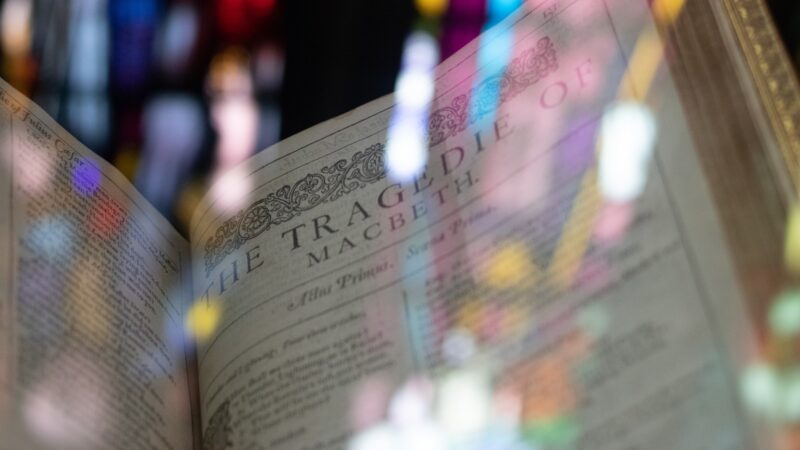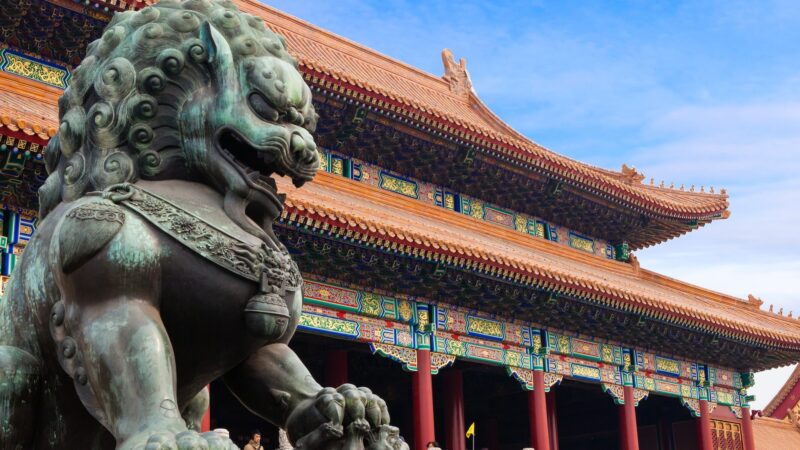A pet peeve of mine is when an antagonist in a book, show, or movie is driven by an ideology that, when he or she is inevitably defeated, nonetheless remains without being dismantled or rendered inept in some way. While, today, it is more often the protagonist driven by his or her writer’s self-inserted worldview, antagonists have, for over a century, often had ideological motivations–saving the climate, achieving some form of racial or sexual (but never ideological) equity, promoting radical resource conservation, whatever. Of course, we keep our hands clean by having the villain nominally lose, but that still leaves the ideology to be dealt with.
If left unanswered, the antagonist’s scheme, though foiled in its dastardly implementation, can too easily become a case of a merely overzealous attempt to produce what some believe to be a nonetheless good, noble goal with whatever hue of progressivism initially drove him or her. The good and the bad becomes, thus, not a matter of principle or goal but of method–the villain or villainess was such because he or she was too radical for those around him or her, etc. Hence, you get people considering whether the Marvel Universe’s Thanos was right in trying to reduce planetary populations by half, whether it wouldn’t be just for Godzilla: King of the Monsters’s Dr. Emma Russel to accelerate some a titanic climate emergency to fully dispense with humanity, or whether X-Men’s Magneto’s openly violent revolution for minority-mutant acceptance wouldn’t be justified–if not just a little satisfying.
Of course, the author who led the way with dealing with explicitly ideological villains was Dostoevsky, who reached his zenith of popularity, not to mention innovation, by dismantling Turgenev’s and Chernyshevsky’s ideological heroes. He did this often through mockery but predominantly through exposing to light of their ideologies through his antagonists who share them. Let us attend: the two–exposure and mockery–can and arguably should go hand-in-hand.
Dostoevsky made it his M.O. to resolve his characters’ conflicts by showing why their motivations are as bad as (or worse than) the attempted implementation. However, there was another writer, up to whom Dostoevsky looked, who was already doing this in England before Dostoevsky hit the Russian literary scene. I am, of course, talking about Charles Dickens.
No reader of Dickens can miss his criticism of the perspectives and politics of his day, be it open scorn, mocking satire, or earnest plea. While not all of his villains recant their ideas, one of his most complete cases of repentance is also one of his most popular tales, especially come Yuletide. This is none other than A Christmas Carol.
Now, readers will not need me to review the plot of Ebenezer Scrooge, whose name has become synonymous with Christmas in the English-speaking world. However, I nonetheless want to briefly examine points in Scrooge’s arc to see how it is not only his avarice but also the then popular ideology that justified it that is defeated in the end. Dickens pretty handily sets up the contemporary pop philosophy that gilds Scrooge’s greed. Rejecting personal charity for the impersonal, tax-funded state institutions of ‘“prisons…Union workhouses…the Treadmill and the Poor Law,”’ he identifies himself in the first scene as a Social Darwinist and Malthusian Utilitarian. ‘“Christian cheer of mind or body to the multitude,”’ as one of the scene’s collectors of charity puts it? Bah–humbug! ‘“I help to support the establishments I have mentioned,”” he says, ‘“they cost enough; and those that are badly off must go there…If they would rather die…they had better do it, and decrease the surplus population.”’ In Scrooge, Dickens concretises the worst versions of the ideologies gaining popularity as an increasingly rationalistic society dispensed with Christian superstitions of God’s image in each individual, and with them the Christian ethics behind giving of one’s own to the poor.
Of course, Dickens includes us in the dramatic irony that Scrooge’s integrity is neither admirable nor monstrous (yet), but pitiable and foolish. The former is articulated when, drawn through key moments of his past by the Ghost of Christmases thereof–his lonely Christmases as a child, his little sister who would leave behind his supposedly foolish nephew, his erstwhile love for the Christmas season at Old Fezziwig’s regardless of its cost in ‘mortal money’–Scrooge is reminded of how spectacularly he fumbled the bag with his fiancée Belle by grasping a different bag too tightly. The enlightened self-righteousness of Scrooge’s post-Christian ethic is neither as internally consistent nor as impressive as its holder might try to maintain: juxtaposing Scrooge’s excited apology for Fezziwig’s party in spite of himself with an unwillingness to look on the greed that would lead to his present loneliness, Dickens makes clear that Scrooge’s ideological righteousness covers a deeply buried sense of failure, regret, and betrayal of the best aspects of his past self. The scene shakes Scrooge’s supposedly staid principles, and his explicit and implicit admissions that gold is not the be-all, end-all valuer of life serve to begin his reformation.
Having shown why Scrooge is to be pitied for his Malthusian views (which he may not even fully hold), Dickens progresses to show Scrooge that he has also been unnecessarily foolish to hold them. Satisfying the first scene’s foreshadowing, this foolishness is shown when the Ghost of Christmas Present gives us more of his nephew, Fred.
Hard on the heels of shaming Scrooge with the mistreated Bob Cratchit’s nonetheless toasting him, the second Ghost presents Fred’s dinner party, sans uncle. Whereas Cratchit politely rebuffed his wife’s insults to Scrooge, Fred does the same to his wife’s with jollity. ‘“His wealth is of no use to him. He doesn’t do any good with it.”’ When his wife says, ‘“I have no patience with him,”’ Fred returns:
‘“Oh, I have!…I am sorry for him: I couldn’t be angry with him if I tried. Who suffers by his ill whims? Himself, always…[The] consequence of his taking a dislike to us, and not making merry with us, is, as I think, that…he loses pleasanter companions than he can find in his own thoughts, either in his moldy old office or his dusty chambers. I mean to give him the same chance every year, whether he likes it or not, for I pity him.”’
The girls mock the idea of Scrooge’s ever taking Fred up on that chance. However, unbeknownst to them, their mock unknowingly digs the knife of change further into the invisible uncle–not by disclaiming the immorality of his avarice (which might harden him), but by showing how foolish he is to maintain his proud isolation in it.
And the fact is that Scrooge would much rather be with them. In spite of himself, he tries his invisible darnedest to play along with the group’s games, which leads him, unsuspectingly, into being the butt of the night’s climactic joke. Having already shown Scrooge the ineffectuality of his gold and spite, Dickens meets both not with other characters’ argument but with mockery. Little wonder that the later Dostoevsky, who would mock his characters while showing the disastrous real-world consequences of their ideas, counted Dickens as one of his primary influences.
And yet, Dickens does not risk leaving things there, for one man’s pitiable past and foolish present might not undermine an entire ideology, even to the man himself. Before he leaves, the second Ghost reveals to Scrooge the true nature of his ideas–in the forms of the emaciated siblings, Ignorance and Want, hidden beneath his heretofore abundant cloak. ‘“Scrooge started back, appalled. Having them shown to him in this way, he tried to say they were fine children, but the words choked themselves, rather than be parties to a lie of such enormous magnitude.”’ Pushed to choose between the utilitarian phrases of his ideology and his own human sympathy, Scrooge ultimately cannot utter the former.
Readers don’t need me to review Scrooge’s interview with the third Ghost. Suffice it to say, his initial viewpoint, if followed through, will land him little posthumous respect among the living, even those who nominally venerate the old skinflint. Furthermore, to add insult to injury, with none to care for his affairs, Scrooge’s possessions will land in the hands of petty thieves–who, as a last insult to his way of life, parody him in their penny pinching over his personal effects. In death, he is treated according to the utilitarian ideology he espoused in life.
Now, several moments in A Christmas Carol are, without a doubt, moralistic and even a bit preachy in dealing with Scrooge’s ideology (example, the two waifs, above), and can, thus, arguably be skipped in retellings or depictions without the story’s–or Scrooge’s humbling’s–losing much weight. As I have previously written on the story, the falling away of such excesses, bound as they are to ideas and issues contemporary to its writing, is the beginning of a work’s usefulness as art. That so much of A Christmas Carol remains despite its initial polemic speaks to Dickens’s ability to make a point without its feeling like he is doing so.
And yet, his depiction of Social Darwinism remains relevant–not the least because Scrooge’s hardnosed display foreshadows those in our own day who promote state redistribution schemes while foregoing personal charity, yet somehow still thinking themselves moral and on the side of the poor. Furthermore, current progressive ideologies often take on the same self-satisfied tone, even glee, as Scrooge at the supposedly justified handicap or destruction (always their fault) of the designated outgroup–white men, “the rich,” landlords, heteronormative family units, groups indigenous to European lands, etc. Their hijacking every medium they can for the sake not of creating good art but of spreading “The Message” has left a dearth of art and stories that seek not only to include the majority of audiences but also to simply be good for their own sake. The question among conservative creators (which, as I argue in the above linked article, not to mention my novel, includes many more than those who consider or label themselves conservative) of how to create the best art can and should point us to authors like Dickens and Dostoevsky.
While politics was not the point for such authors, they did not shy away from dealing with insidious ideas of their day. The difference between them and authors who see art as inherently political was and should be that, in treating art as a function of greater things than politics–not to mention weighing it against human experience and tradition–they exposed inhuman ideas fully in the lives of their characters. Such a thing necessarily leads, as can be seen in A Christmas Carol, towards at least some characters’ repenting of their ideology towards a more wholistically human ethic that balances personal rights and interests with duties and responsibilities for others–one I would argue is best found in the Christian view of man and its subsequent moral tradition, articulated implicitly in Dickens and explicitly in Dostoevsky.
Like many pre-20th-century books, A Christmas Carol is refreshing, if nothing else because its lesson is for its protagonist (who is also its antagonist), not its readers, who are included in the joke. However, even thus reducing it to a “lesson” is to render it as inhumanly provincial as is the pre-repentance Scrooge. We should look to older literature not just to nostalgically escape the present (though that’s often a necessary salve), nor to learn how to “retvrn” to a time before all the other advancements our culture has made (on the backs of the previous centuries’ literature and ethics, one should add). We should do so because older books have survived the changing of times.
Said survival is not, as Marxist progressives claim, because their popularity has been artificially and oppressively maintained in various social traditions and structures (though one man’s supposedly oppressive structure might be many other men’s most efficient means of justly and safely ordering society). Rather, it is because their authors concretised elements of human life that are and will remain immutably true. That, of course, can have implicit ideological or political (etc.) ramifications, but such accidental effects are not their core substance. Watching a rendition of A Christmas Carol to get into the Christmas spirit might have the effects of motivating us to give to the less fortunate or to look, Cratchit-like, with forgiveness on even the most oppressive of our fellow men (or on ourselves, as Scrooge, himself, learns to do). However, to see this kind of thing as inherently political or ideological is, itself, to maintain an ideology about the relationship between art, actual people, and each other that would reduce all three. Thankfully, should we want to dismantle such a thing, we know where to look.



